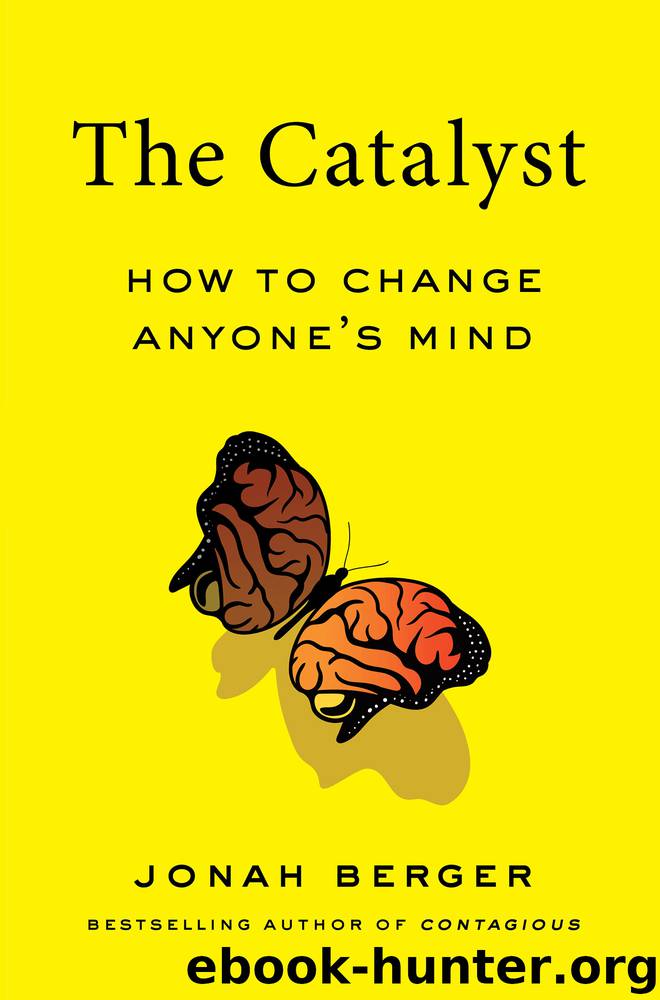Catalyst by Jonah Berger

Author:Jonah Berger
Language: eng
Format: epub
Publisher: Simon & Schuster UK
Published: 2020-03-02T16:00:00+00:00
* * *
In the early 2000s, three University of Chicago researchers asked people how much they would be willing to pay for a $50 gift card.1 The gift card was to a local retailer and had to be used in the next two weeks.
After thinking about it, people said they would be willing to pay around $26 on average. Some didn’t shop at that retailer, and others might have been worried about the two-week expiration date. These aspects, combined with others, led them to value the gift card at around half its actual value.
Another group of people was asked how much they would be willing to pay for a $100 gift card to that retailer, and the results were similar. On average, people said they would pay around $45. Some said more, some said less, but on average, for all the reasons noted above, people said they would pay around half its actual value.
Again, no surprise.
For a third group, however, the researchers introduced some uncertainty.2 This group was offered a lottery ticket with a fifty-fifty shot. A 50 percent chance of winning a $50 gift card and a 50 percent chance of winning a $100 gift card. How much would people pay for this lottery ticket?3
Before getting to the answer, consider an even simpler question. Compared to the $50 gift card, how much should people be willing to pay for the lottery ticket? Should they be willing to pay more than the $50 gift card? Less? About the same?
When thinking through a question like this, the “rational” answer is pretty clear-cut. The value of a risky opportunity should sit between the best and worst possible outcomes.
Take a used car. The blue book value is $10,000, but the car might need a new timing belt. And if it does, the repair would cost $1,000. Given that, most people would say the car’s value is somewhere between $9,000 and $10,000. The value if it does or doesn’t need the new belt.
You might average the two values and say the car is worth $9,500. Or lean more toward $9,000 (e.g., $9,250) if you really think it needs a new timing belt. Regardless, the used car’s value should sit somewhere between $9,000 and $10,000. Somewhere between the best and worst possible outcome.
The same logic should apply to the gift cards. It’s not clear whether the lottery ticket will net a $50 gift card or a $100 gift card, but worst case it’s a $50 one. So people should be willing to pay at least that much. Maybe not a lot more, but at least a little.
But they weren’t.
No. When researchers analyzed the data, they found the exact opposite. People weren’t willing to pay more for the lottery ticket. Not even a little. And they weren’t even willing to pay the same amount. In fact, while they were willing to pay around $26 for the $50 gift card and $45 for the $100 gift card, they were willing to pay only around $16 for the lottery ticket.
Download
This site does not store any files on its server. We only index and link to content provided by other sites. Please contact the content providers to delete copyright contents if any and email us, we'll remove relevant links or contents immediately.
Hit Refresh by Satya Nadella(9137)
The Compound Effect by Darren Hardy(8969)
Change Your Questions, Change Your Life by Marilee Adams(7783)
Nudge - Improving Decisions about Health, Wealth, and Happiness by Thaler Sunstein(7707)
The Black Swan by Nassim Nicholas Taleb(7129)
Deep Work by Cal Newport(7085)
Rich Dad Poor Dad by Robert T. Kiyosaki(6633)
Daring Greatly by Brene Brown(6514)
Principles: Life and Work by Ray Dalio(6449)
Playing to Win_ How Strategy Really Works by A.G. Lafley & Roger L. Martin(6308)
Man-made Catastrophes and Risk Information Concealment by Dmitry Chernov & Didier Sornette(6019)
Big Magic: Creative Living Beyond Fear by Elizabeth Gilbert(5774)
Digital Minimalism by Cal Newport;(5765)
The Myth of the Strong Leader by Archie Brown(5508)
The Slight Edge by Jeff Olson(5418)
Discipline Equals Freedom by Jocko Willink(5390)
The Motivation Myth by Jeff Haden(5213)
The Laws of Human Nature by Robert Greene(5208)
Stone's Rules by Roger Stone(5088)
